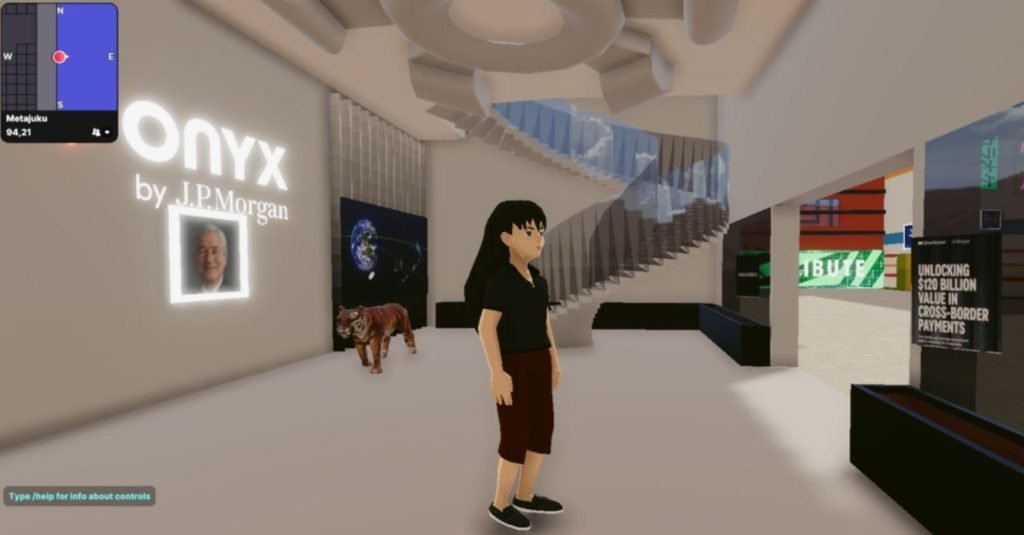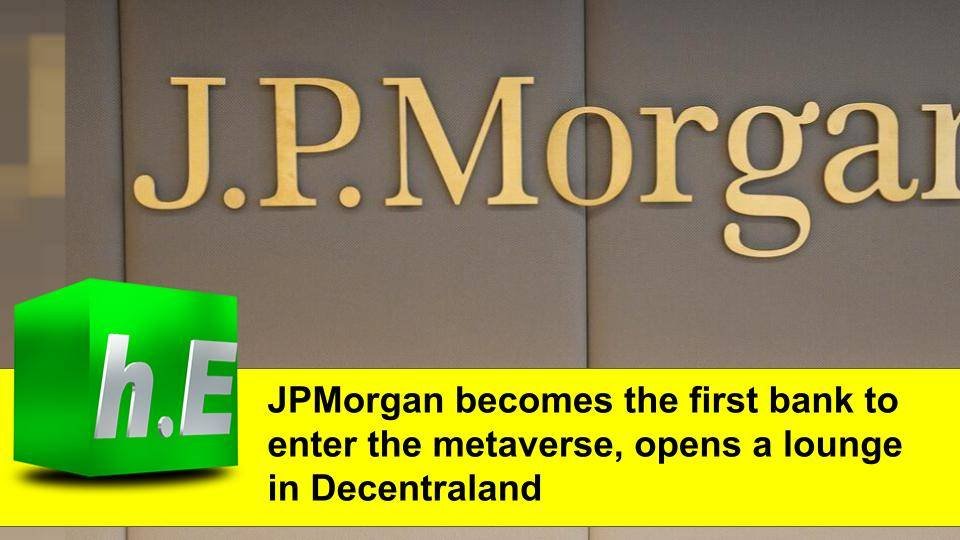JPMorgan took a big step into the metaverse Tuesday, jumping into the nascent space with a virtual lounge in the popular blockchain-based world Decentraland.
The “Onyx lounge” was unveiled along with a report from the bank outlining metaverse-related growth opportunities for businesses and causes for its “explosive interest.”
“When you think about the economics of the metaverse — or metanomics — there are opportunities in almost every market area.” the bank wrote. “We are not here to suggest the metaverse, as we know it today, will take over all human interactions, but rather, to explore the many exciting opportunities it presents for consumers and brands alike.”
The metaverse, JPMorgan said, has a market opportunity of $1 trillion in yearly revenue, as creators tap Web3 to monetize their work in new ways.
The JP Morgan report also noted that between June and December last year, the average price of virtual land doubled from $6,000 (€5,000) to $12,000 (€10,000). It also predicted that in-game advertising spending will reach $18.4 billion (€16 billion) per year by 2027.
“This democratic ownership economy coupled with the possibility of interoperability could unlock immense economic opportunities, whereby digital goods and services are no longer captive to a singular gaming platform or brand,” the report said.
JPMorgan is the first bank to set up a metaverse office. But it follows on the now well-trodden path of big brands, businesses, and influencers entering the metaverse.

The metaverse is made up of not one, but various virtual worlds—popular ones being browser-based Decentraland; the Sandbox, owned by Hong Kong’s Animoca Brands; and Roblox, which is favored among kids and teens. Users use digital avatars to explore these virtual lands, where they can socialize, play games, purchase real estate, browse the art, or go shopping.
In recent months, companies have rushed to enter the metaverse. Retail and entertainment brands from Walmart and Nike to Disney and Warner Music Group all joined the rush.
Warner Music, the entertainment behemoth that’s home to a star-studded artist roster including Dua Lipa and Red Hot Chili Peppers, is currently building a concert-focused theme park on the metaverse platform the Sandbox.
Luxury brand Gucci has purchased land on the same platform to develop a space to host “immersive experiences” and offer digital fashion items for purchase, targeted at Gen Z. The Sandbox has already cultivated over 200 partnerships with companies, brands, and individuals including rapper Snoop Dogg, sportswear firm Adidas, and Japanese gaming company Atari, says the report.
But companies from a wide array of industries are now finding use cases for the metaverse, including smaller firms from the architecture, real estate, and even tax and accounting sectors. The U.S.-based Prager Metis accounting firm, for instance, opened its three-story metaverse headquarters in Decentraland last month.
The company has been “constantly fielding inquiries from…clients trying to understand the metaverse from a financial and tax compliance perspective,” says Jerry Eitel, partner at Prager Metis. “Every tax and accounting issue [applicable to businesses] in real life is also applicable to the metaverse,” he says.
Real estate has also boomed in the metaverse economies. Virtual land sales have been driven by the growth of the “ownership economy” in Web3, a new iteration of the internet that enthusiasts advocate as decentralized, equitable, and user-controlled.
Virtual real estate is a “growing market,” says JPMorgan, and brands have contributed by “buying up space so they can create virtual stores and other experiences.” The average price for a parcel of virtual land doubled in just six months last year, surging from $6,000 in June to $12,000 by December across the four main metaverse platforms, says the report.
We have always emphasized the importance of having a good website for your company because it can act as your best tool for marketing and sales. A poorly designed website can repulse people from your business and can cause you to lose customers before you even have them. Get in touch with HyperEffects to work on creating, enhancing, and making the website of your company more user-friendly.

